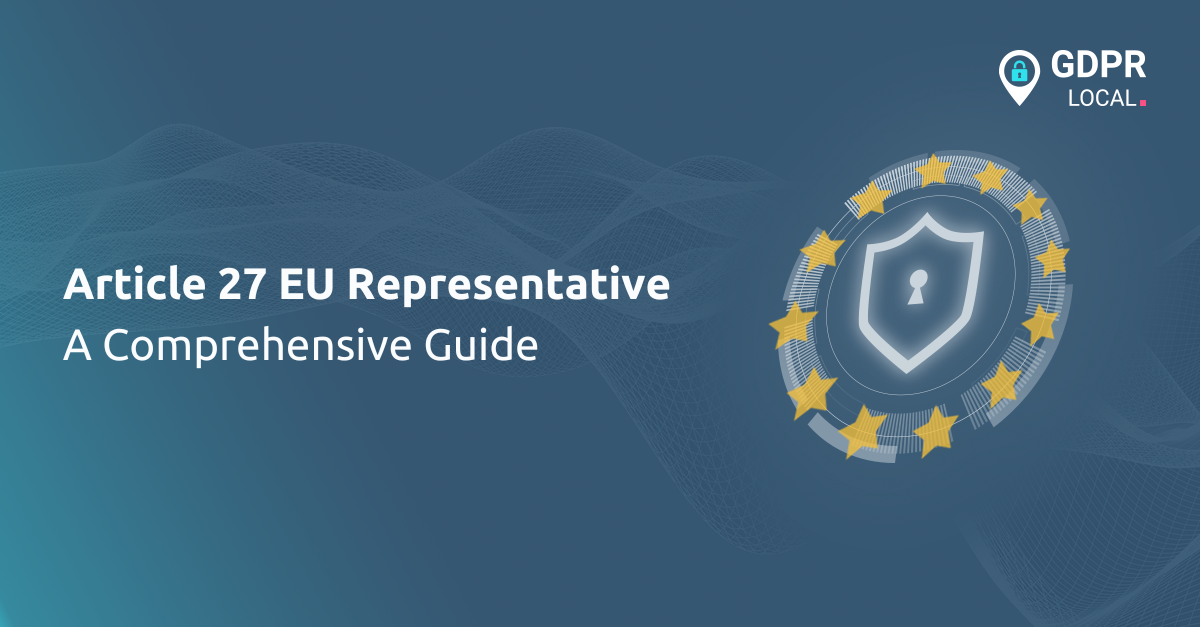
Article 27 EU Representative: A Comprehensive Guide
Updated: August 2025
Introduction to Article 27 of the GDPR
The General Data Protection Regulation (GDPR) has drastically transformed our approach to how organisations handle personal data. With its stringent rules and hefty fines, it’s imperative for businesses to be compliant. Article 27 of the GDPR affects organisations outside the EU and is a crucial provision of the regulation.

Let’s explore it together.
Explanation of GDPR and its Key Provisions
The GDPR is a comprehensive data protection regulation that came into effect in May 2018. The EU aims to give citizens greater control over their personal data and ensure transparency in the use of data. The GDPR not only empowers individuals with the right to know how their data is being used but also imposes stringent obligations on organisations to handle and process data responsibly. By setting a gold standard for data protection, it fosters a digital environment where privacy is prioritised and respected.
Overview of Article 27 and its Significance for Organisations
Article 27 applies to non-EU organisations that process the personal data of EU residents. They must select an EU representative to serve as a point of contact for individuals and authorities within the EU.
This requirement ensures that even non-EU entities engaging with EU citizens’ data maintain a tangible presence for communication and accountability, reinforcing the global commitment to safeguarding personal information.
Requirements of Article 27 EU Representative
Appointing an EU representative is not just a formality. It’s a crucial step in ensuring GDPR compliance for non-EU businesses.
This role within your company serves as a bridge between the non-EU entity and European data subjects, playing a pivotal role in addressing inquiries, cooperating with supervisory authorities, and facilitating a seamless and secure exchange of information in accordance with the stringent data protection standards outlined in the GDPR.

Detailed Explanation of the Obligations for Appointing an EU Representative
Organisations outside the EU must appoint an EU representative if they handle personal data of EU residents. This requirement applies regardless of whether they control or process the data. This representative acts as a bridge between the organisation, data subjects, and supervisory authorities in the EU.
This proactive approach not only safeguards individual privacy rights but also enhances trust between businesses and EU residents in the evolving world of data protection.
Key Criteria for Determining the Need for an EU Representative
If you sell to or track EU residents, you need an EU representative – it’s that simple. This requirement does not apply if you only occasionally process data and do not handle sensitive data on a large scale.
Identifying the Role of EU Representatives
Understanding the role of an EU representative is crucial for effective GDPR compliance. Their role extends beyond a mere regulatory obligation, becoming a cornerstone in establishing a trustworthy and compliant relationship between non-EU entities and the European data protection framework. The EU representative becomes an invaluable asset to the company, as it maintains compliance at the highest level.
Comparison Between EU Representatives and Data Protection Officers
While both roles are pivotal for GDPR compliance, they serve different functions:
An EU representative in the EU is a local contact, acting as a liaison for communication. A Data Protection Officer (DPO) ensures GDPR compliance for personal data processing by implementing and overseeing data protection policies and practices within the organisation. Each role complements the other, forming a comprehensive framework for robust data governance.
Responsibilities and Functions of EU Representatives

EU representatives are responsible for:
• Cooperating with supervisory authorities
• Being available for inquiries from data subjects
• Maintaining a record of the processing activities of the non-EU organisation
Compliance with Article 27
Ensuring compliance with Article 27 is not just about avoiding fines; it’s about building trust with EU customers.
Step-by-step Guide to Ensure Compliance with Article 27 Requirements
• Determine if your organisation needs an EU representative.
• Choose a representative based in an EU member state where your data subjects are located.
• Draft a written mandate detailing the representative’s tasks and responsibilities.
• Update your privacy policy to include the contact details of your EU representative.
• Regularly review and update your compliance measures.
Best Practices for Appointing and Working with an EU Representative
• Choose a representative with a strong understanding of the GDPR.
• Ensure clear communication channels with your representative.
• Regularly update your representative about any changes in your data processing activities.
Guidelines and Recommendations
Several industry sources provide insights and guidelines for GDPR Article 27 compliance. It’s advisable to refer to these sources, such as the EDPB guidelines, for a deeper understanding.
Common Questions and Answers about EU Representatives
1. When is an EU representative required under Article 27 of the GDPR?
Whenever a non-EU organisation processes personal data of EU residents and doesn’t have an establishment in the EU, an EU representative is required.
2. What are the responsibilities of an EU representative?
They act as a contact point for data subjects and supervisory authorities, cooperate with supervisory authorities, and maintain a record of processing activities.
3. How do EU representatives differ from data protection officers?
EU representatives act as local contact points in the EU, while DPOs ensure GDPR compliance within an organisation.
4. Can a business designate the same person as both an EU representative and a data protection officer?
Yes, but it’s essential to ensure that there’s no conflict of interest and both roles are effectively fulfilled.
The Impact of Article 27 on Non-EU Businesses
Non-EU businesses need to understand their obligations under Article 27 to ensure smooth operations and avoid potential legal complications.
Understanding the obligations for businesses based outside the EU
Non-EU businesses that process personal data of EU residents have specific obligations under the GDPR, including appointing an EU representative. This ensures that individuals in the EU can easily access support and information, thereby reinforcing the fundamental right to privacy in an increasingly interconnected digital landscape.
Compliance challenges and considerations
While appointing an EU representative is a step towards compliance, non-EU businesses must also ensure that their data processing activities align with the GDPR.
This involves a comprehensive evaluation of data handling practices, implementation of robust security measures, and fostering a privacy-conscious culture within the organisation. Achieving GDPR compliance extends beyond a mere procedural step, requiring a holistic commitment to safeguarding personal data and respecting the principles embedded in the regulation.
Conclusion
Article 27 of the GDPR states that non-EU businesses must be established in the EU to protect data. Following this rule helps organisations gain trust from EU customers and avoid legal problems.
As we explore new subjects, it’s always a good idea to revisit the basics and where it all began. If you have any questions or need assistance with GDPR & data protection, please reach out to [email protected].
FAQs (Frequently Asked Questions):
1. When is an EU representative required under Article 27 of the GDPR?
Whenever a non-EU organization processes personal data of EU residents and doesn’t have an establishment in the EU.
2. What are the responsibilities of an EU representative?
They act as a contact point for data subjects and supervisory authorities, cooperate with supervisory authorities, and maintain a record of processing activities.
3. How do EU representatives differ from data protection officers?
EU representatives act as local contact points in the EU, while DPOs ensure GDPR compliance within an organisation.
4. Can a business designate the same person as both an EU representative and a data protection officer?
Yes, it’s essential to ensure there’s no conflict and that both roles are performed well.